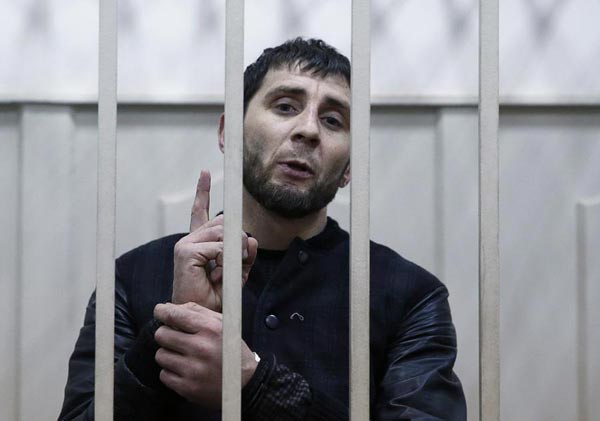Russian court charges 2, detains 3 others in Nemtsov killing
(Agencies) Updated: 2015-03-09 10:10
 |
|
Zaur Dadayev, charged with involvement in the murder of Russian opposition figure Boris Nemtsov, speaks inside a defendants' cage in Moscow, March 8, 2015. [Photo/Agencies] |
MOSCOW - Five men were behind bars Sunday either charged or suspected in the killing of Kremlin critic Boris Nemtsov, but details remained unclear in the case that has shaken Russia's marginalized and struggling opposition movement.
The five appeared in a Moscow court, where two of them were charged in connection with the shooting of Nemtsov as he walked across a bridge near the Kremlin on Feb 27. The other three were remanded to jail pending the filing of charges, which Russian law says must be done within 10 days.
Russian news reports meanwhile cited unnamed sources as saying another suspect had killed himself with a grenade after police blocked his apartment on Saturday in Grozny, the capital of the republic of Chechnya. There was no official comment from Moscow on the reports, but Chechen President Ramzan Kadyrov appeared to partially confirm it Sunday.
One of the judges in the two separate hearings said suspect Zaur Dadaev had acknowledged involvement, but Dadaev did not admit guilt in the courtroom, according to state-run and independent news agencies in Russia. The other suspect who was charged, Anzor Gubashev, denied guilt, the reports said.
The three others include Gubashev's younger brother Shagid, along with Khamzad Bakhaev and Tamerlan Eskerkhanov, state news agency Tass reported.
All five are from Chechnya or other parts of the restive North Caucasus, according to news agencies. Their origin raises a potentially sensitive issue, given the significant animosity for Caucasus groups among ethnic Russians.
Chechnya suffered two intense wars over the past two decades between Russian forces and separatist rebels increasingly under the sway of fundamentalist Islam. That reinforced the stereotype among many Russians of Chechens as violent extremists.
Kadyrov, the current Chechen president, has himself imposed many Islamic rules on Chechnya, including the wearing of headscarves by women, but is also a vehement loyalist of Russian President Vladimir Putin and has blamed Nemtsov's killing on Western security services.






